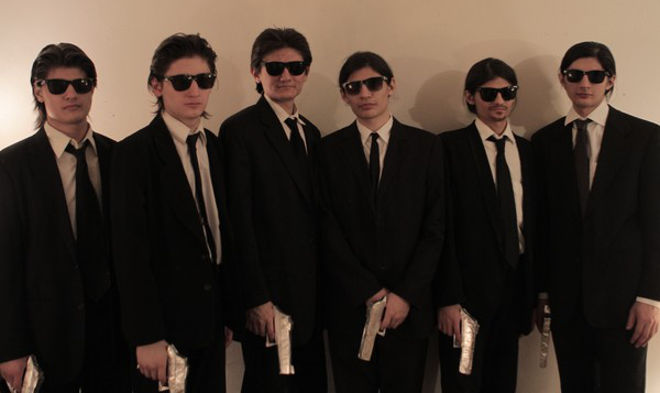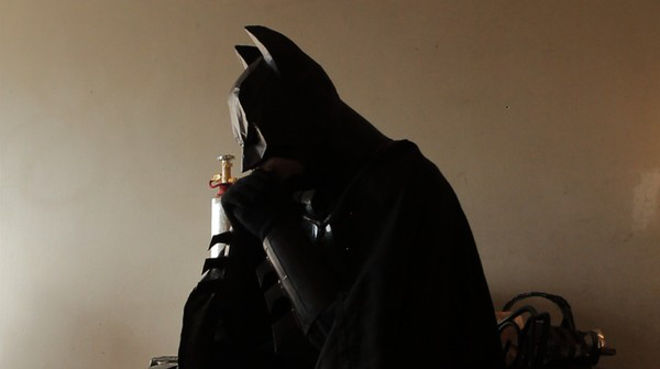We Talked To Director Crystal Moselle About The Boys Of ‘The Wolfpack’, And How Their Family Has Responded To The Film
"I was always contemplating whether I should be telling their story."

The story of how Crystal Moselle stumbled upon the subjects of her first feature documentary is now almost as well-known as the remarkable story of The Wolfpack’s subjects themselves: the six Angulo brothers, home-schooled by their mother Susanne, and raised in isolation by their dictatorial father Oscar, who kept the family locked inside their New York apartment.
(A seventh child, a girl, has a developmental disorder, and is not featured in the film.)
The boys absorbed much of their knowledge of the outside world from the Hollywood movies their father permitted them to watch. When Moselle (now 35), a director of documentary shorts and commercials, first spotted the Angulos, they were racing past her on the Lower East Side of New York, long-haired and distinctively attired (the publicity material for the documentary has invited comparisons between the brothers appearance and the crew from Reservoir Dogs).
Moselle chased after them and they started to chat about movies – the boys were impressed that she was a filmmaker. She offered to show them her gear and eventually started filming them, with little notion of the documentary it would turn into. The resulting film premiered at Sundance this year to wild acclaim, and recently played two sold-out sessions at the Melbourne International Film Festival. We chatted with Moselle when she was in town for the festival.
“I was always contemplating whether I should be telling their story.”
Looking back on the decision to start filming, Moselle says she didn’t have a particular aim in mind. “It was like, Oh I’ve met these kids, they’re very interesting, I’m going to shoot them, we’re going to talk about movies together. I’m not really sure what it is.”
“It was really just about being inspired by them as people; asking them questions, shooting them, and just hanging out,” she says. “As time went by I was like, Oh, maybe I’ll shoot a behind-the-scenes of them making their first short film. I didn’t know anything about their backstory at that point, either. They just slowly revealed it.”
What they revealed was a childhood of near-complete isolation, a situation that only changed when middle child Mukunda, then 15, ventured out the front door alone, and wandered the streets dressed as the killer Michael Myers, from the Halloween slasher films. He was detained by the police, brought home and instructed to undergo counselling, but the dam had broken: the children started to venture out more and more, and their father’s grip on the household began to weaken.
“It was really difficult to hear,” Moselle says of the Angulos’ past, which she only began to learn about after almost a year of friendship with them. “And I was always contemplating whether I should be telling their story. I wanted them to really understand what it meant for a film about their lives to be out in the world. But they wanted to tell their story, so we did. I didn’t want to put my judgments on it. I just wanted to capture it as it was.”
“I think that’s why it took so long,” she says of the filming process. Moselle began shooting in 2010, and only finished in November last year. Much of that time she balanced filming with her commercial work, visiting the brothers semi-regularly – including on planned excursions, like a trip to Coney Island. Other footage was shot by the brothers themselves, with a camera provided by Moselle. “I wasn’t trying to figure out what happened … They would just reveal things to me, and open up to me.”
A “failed cult leader”
One of the most fascinating figures in the documentary is the boys’ father Oscar, an apparently controlling man who kept his family in a state of fear. In one of the many vivid offhand comments in the film that hints at stresses of his childhood, Mukunda recalls that he and his siblings once spent an entire year without being allowed outside.
Moselle has structured the film so that Oscar is initially kept on the edges of the story. The camera catches glimpses of him in the apartment corridors, and at one point edges quietly into a room where he’s watching TV; other slices of footage—some presumably shot by the brothers—suggest he has something of a drinking problem. But he doesn’t fully emerge as a character until the latter half of the documentary.
The film eventually reveals that Oscar, a Peruvian, had met the boys’ mother Susanne while she was travelling in South America. The two moved to New York, intending to immigrate to Scandinavia, where they hoped to live free of what Oscar saw as the oppressive American system. Evidently they never moved on, and Oscar inculcated in his family a deep suspicion of American life and work (one of the family’s sole sources of income, it appears, were payments made to Susanne for home-schooling the children).
In an interview later in the film, Moselle tries to press Oscar on the meaning of his behaviour toward his family, but he is unrepentant about his conduct, brushing it off with a what’s-done-is-done shrug. Whatever impulse caused him to treat his family in such a rigid way seems to have dissipated. In other interviews, Moselle has suggested that he’s something of a “failed cult leader”.
I asked her whether she thinks Oscar will ever be able to be truly self reflective about his behaviour. “I hope he does,” she says. “I hope he takes responsibility.”
“It’s educational for me to see my children like this”
Of the many tantalising questions the film raises, one of the most pressing is what the parents themselves thought of Moselle’s appearance in their children’s lives — and what opinion they have of the final film.
“They were very open, both of them were,” Moselle says. The brothers and their mother attended the film’s premiere at Sundance Film Festival in April. “[The boys] are obsessed with films, and I’m a filmmaker, so their parents were very happy for them that they were able to connect with somebody who was interested in what they love.”
By the time Moselle started filming the Angulos, the power dynamic in the family had shifted, following Mukunda’s pioneering excursions into the outside world. The kids “really had all the power in the household at that time,” Moselle says.
Oscar apparently has seen The Wolfpack and thinks it’s a “beautiful” film. “He says, ‘Oh, it’s educational for me to see my children like this’,” according to Moselle.
“They’re doing amazing”
Moselle now says the brothers are “doing amazing”, embracing the opportunities afforded by the films’ release (they recently travelled to the UK for its London premiere, too), and working on projects of their own. The eldest, Bhagavan, is now “into dance”, Moselle says, while second eldest, twins Govinda and Narayana, are getting into filmmaking and activism respectively (Govinda, an aspiring cinematographer, has just shot his first feature). The youngest brothers, Moselle says, “are more into the ladies”.
Middle child Mukunda, the first to venture outside the apartment alone, is now working in filmmaking as well. It’s Mukunda’s obsession with cinema–including transcribing favourite scripts, making elaborate costumes, and dressing up at Batman from The Dark Knight—that forms the spine of the documentary. Since its release, he’s also directed a piece for Vice through Wolfpack Pictures, a production company established by the brothers.
‘The Wolfpack’ finishes with an exquisitely staged, Michel Gondry-esque short film that the brothers shot in their apartment. It’s fitting that they’re now able to carry this interest into the outside world. As Moselle puts it, “Creating these other worlds was a way for them to cope with the pain they were going through.”
–
The Wolfpack opens in Melbourne at Cinema Nova on Thursday August 27, at Dendy Newtown in Sydney on Thursday September 3, and at Luna Leederville in Perth on Thursday September 10.
–
James Robert Douglas is a freelance writer and critic in Melbourne. His work has been found in The Big Issue, Meanland, Screen Machine, and the Meanjin blog. He tweets from @jamesrobdouglas.
Feature image by Larry Busacca, for Getty.

